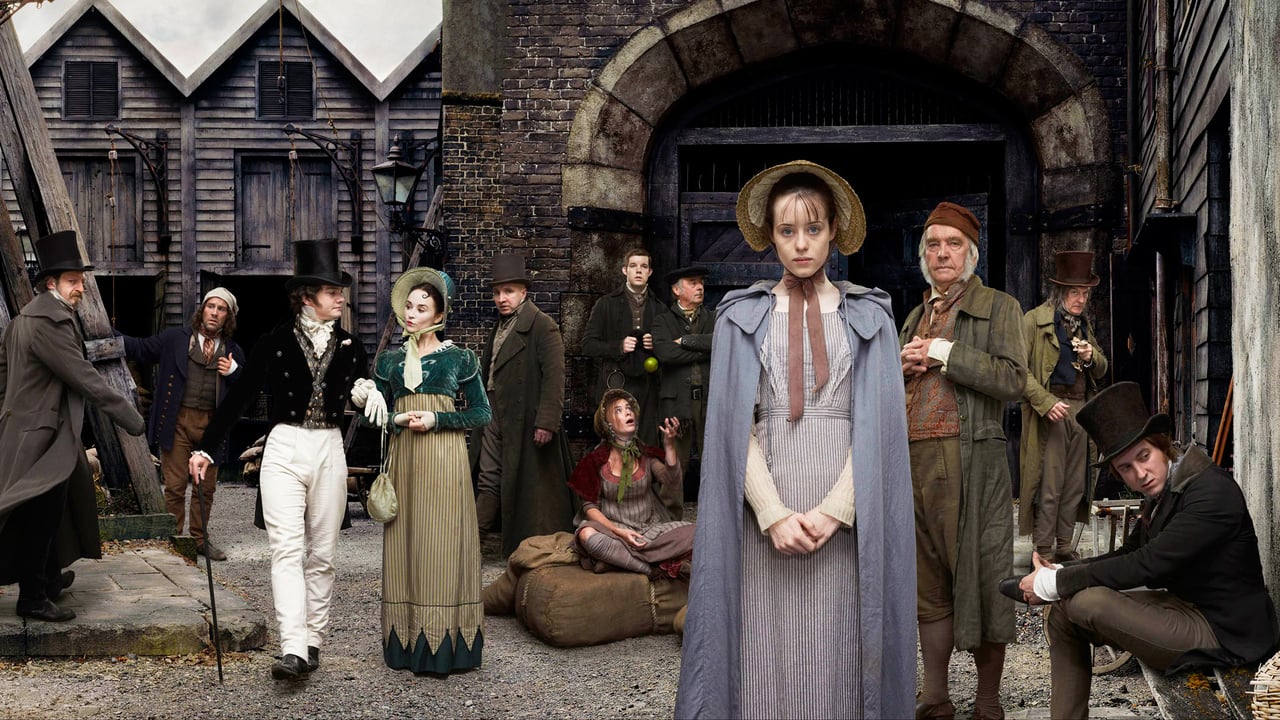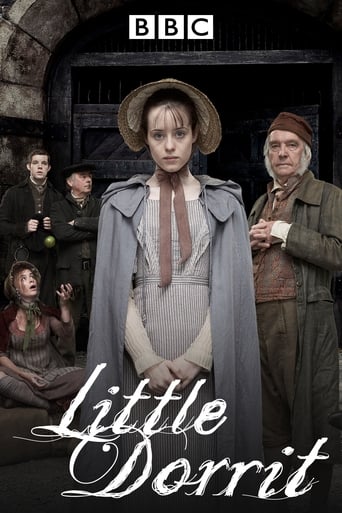

Two things I never miss are Dickens adaptations and Tom Courteney movies. I've been a fan of Dickens since my sixth grade reading of OLIVER TWIST and I love a good Dickens adaptation as much as a good Dickens book. The longer, the better. And I've tried to catch everything Mister Courtenay has done since his sixties appearances in "Billy Liar" and "Dr. Zhivago" and "Otley" right up to recent readings of his autobiography on BBC radio to an awful radio play he did about a bus driver. And while Mister Courtenay is one of those actors who seem born to play Dickens (his malignant Quilp was the highlight of "The Old Curiosity Shop") he really is better made for Dickens' nice, decrepit characters like Newman Noggs in 2002's "Nicholas Nickleby." But Courtenay simply doesn't have the authority to play William Dorrit, little Dorrit's father.In 1987's "Little Dorrit" Alec Guinness (another perfect Dickens actor from his youthful turn as Herbert Pocket in "Great Expectations") was cast as William. The same quiet authority that made Guinness shine as the sage in "Star Wars" gave him the gravitas he needed as the fallen man who maintains his dignity in debtors' prison (one of Dickens' favorite settings) so that he could be called "the father of the Marshalsea." Had he been twenty years younger, Courtenay might have played Arthur Clennam (an almost invisible Mathew Macfayden; the role was much better done by Derek Jacobi in the 1987 version, where Jacobi was able to play the weak-willed son without getting lost altogether).As far as the rest of the flick, it evokes the the period much better than the 1987 version, which was obviously stage-set and done, despite the talent involved, on a shoestring. Though today's more weird focus on the dirt of Dickens' day rather than the shiny bits is a bit off-putting.The best thing about the movie, besides an otherwise strong cast (Alun Armstrong as Flintwinch, James Fleet as Frederick, Ron Cook as Chivery, etc.) is the introduction of Little Dorrit herself (Clair Foy), done in half-face. It's a beautiful image of little Dorrit, who even in Dickens is somewhat of a mystery character (though she is much more explicable here than in 1987, probably because Foy is a better actress).As for William, a stronger actor than Courtenay (a Burton or a Wolfit) would have come off as a phony while an actor tending toward the comedy in Dickens (a Broadbent, say) might have missed the gravitas.Courtenay is an excellent actor who deserves to be plugged in to every major Dickens adaptation going, but he comes off here as one thing William Dorrit was without showing it--desperate; and one thing William certainly was not--whiny.
... View MoreThis adaptation takes the book very seriously, and is a true adaptation. 14 episodes at first seemed a little daunting, but this series is captivating, with wonderful characters and fantastic cinematography. The soundtrack suits the series well, and just gives that extra touch to get the watcher crying, laughing, and sighing at the television screen! You truly feel like you are in the series, which makes it a series in a league of it's own. The casting is fantastic, and well done for Claire Foy - she portrayed the character brilliantly for a first large part! In the end, if I had to describe this series in one word; it's really, truly 'sweet' - there is no other word! - and will no doubt leave the viewer with a smile on their face by the end of it!
... View MoreI stumbled on to this series about half way through an early episode purely by accident and within 5 minutes I was totally hooked - wow. My favorite programs are a combination of a great story, careful character development and excellent acting. This series has all these and more - the cinematography shows great sensitivity, the sets and costumes world class and even the theme music is mesmerizing. Each episode practically stands on it's own. It's the whole package.Clair Foy is nothing short of brilliant - I have never seen a character that so completely captures your sympathies and heart. She is the perfect manifestation of beauty being so much more than skin deep.Matthew Macfadyen is the idea counterpart and perfectly represents the goodness that mankind can (should) strive to achieve. The electricity between Matthew Macfadyen and Claire Foy is also magic.Tom Courtenay performance is in many ways the most extraordinary of all. His role as William Dorrit is by far the most complex and challenging. Tom Courtenay's insight into this complex and rapidly evolving character is truly remarkable - I have seen very few that could compare. In my mind on the same level as George C. Scott in Patton.The other supporting actors are also faultless almost to a man (or woman).If you haven't seen this one - I suggest you do it's great and timeless entertainment.
... View More... hardly "Little" when you see it spread over 12 half-hour and two hour-long bookend episodes, BBC's new production repeats the successful episodic template of the previous "Bleak House", with adaptor-extraordinaire Andrew Davies' latest dramatisation of classic Dickens again, proving, on the whole to be a successful and highly entertaining epic. The novel (no pun intended) idea of breaking down the book to bite-size half-hour chunks to echo the monthly magazine serialisation in Dickens' own time, certainly kept me looking forward with anticipation to the next one, even if it does cater to the half-hour-soap mentality and attention-span of much of today's target audience. The settings were superb, with every background filled in and peopled appropriately, from the squalor of The Marshalsea Prison to the grandeur of the stately homes of London and Venice as The Dorrits make their parabolic journey on the path of moral regeneration. The direction was well-paced and occasionally imaginative while the acting, with a few exceptions was excellent, particularly in the crucial main roles where Claire Foy and Matthew Macfadyen in arguably the leads convey without too much sentimentality (Dickens' goodly characters frequently teeter on the edge of over-sentimental caricature) their traits of honesty, loyalty, self-sacrifice and humility. The story has elements of Trollope's "The Way We Live Now" (another recent BBC/Davies triumphant adaptation) in its exposure of the unprincipled fat-cats at the centre of high finance, with of course echoes of today's post-credit-crunch collapsing banks in the depiction of Mr Merdle as the epicentre of the bubble that has to burst sometime. Plus ca change... Everyone will have their own favourites amongst the rest of the cast. I was particularly impressed by Eddie Marsan as the tough rent-collector with a heart, the snorting Pankes, Russell Tovey as the lovelorn lock-keeper's son John Chivery, Ruth Jones as Clennam's blowsy, bloated childhood sweetheart, Flora Flinching (her transformation from the slim teenager of his memory to today's fat frump, was deftly rendered) and Flora Robson lookalike Judy Parfitt as Arthur's cold, immovable (in every sense of the word) "mother". The biggest star on board, arguably, is Tom Courteney who skilfully makes sympathetic the basically aloof, pompous, self-deluding Mr Dorrit, particularly his descent into madness and sudden death. On the debit side, I found Freema Agyeman miscast and tending to overact in the admittedly difficult part of Tattycoram and if I was being picky just a little too much of the archetypal Victorian melodramatic villain in the performances of John Alderton and Andy Serkis as the rogues of the piece, Casby and Rigaud/Blandois. Davies' screenplay as ever can't resist the odd allusion to today, but I always find such moments jarring and there are certainly some crudities here which I don't recall Dickens employing. Seems such a shame to go to all the trouble of period recreation to besmirch it with clever-clever in-jokes to a modern audience. That said however, I was thoroughly transported into the Dickens' world that I love and wait with anticipation, the next production. Davies should take on a real challenge in my opinion next time with "Edwin Drood" and fashion us a credible conclusion to Dickens' death-shortened final work.
... View More